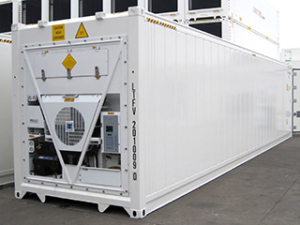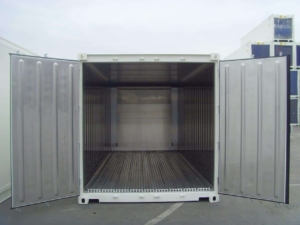In the world of global trade and logistics, where goods travel across vast distances and varied climates, maintaining the integrity of temperature-sensitive cargo is paramount. Whether it’s fresh produce, pharmaceuticals, or a shipment of chocolates, the ability to control and preserve the cargo’s temperature throughout its journey is a make-or-break factor. This is where refrigerated shipping containers, often referred to as “reefers,” emerge as the unparalleled champions of cold chain logistics. In this exploration, we’ll unveil the reasons why refrigerated shipping containers have ascended to the pinnacle of cold chain logistics, safeguarding the freshness and quality of goods from source to destination.

The Essence of Cold Chain Logistics
The term “cold chain logistics” refers to the management of the temperature-sensitive supply and distribution of goods. This encompasses a wide array of products, including perishable food items, vaccines, pharmaceuticals, and chemicals. The cold chain is essential to ensure that these items maintain their quality, safety, and efficacy from production to consumption.
The heart of cold chain logistics lies in the preservation of the cold chain – the continuous storage and distribution of products within a specific temperature range. This is where refrigerated shipping containers play an indispensable role, making them the pinnacle of cold chain logistics.
The Stakes of Temperature-Sensitive Cargo
The stakes are high when it comes to temperature-sensitive cargo. A slight temperature deviation can lead to:
- Financial Loss: Cargo that is compromised during transit, due to temperature fluctuations or inadequate storage, can result in substantial financial losses for businesses, emphasizing the importance of reliable refrigerated shipping containers.
- Regulatory Compliance Issues: Many products, especially pharmaceuticals and food items, must adhere to stringent temperature control standards to comply with regulations.
- Consumer Safety: Most importantly, compromised cargo can risk the safety of consumers, particularly when it comes to vaccines and medications.
The Rise of Refrigerated Shipping Containers
Reefer containers are the answer to these high-stakes challenges. They’ve risen to the pinnacle of cold chain logistics due to several key attributes that set them apart as game-changers:
- Precise Temperature Control: Reefer containers are engineered with advanced thermostats and cooling systems that maintain a consistent internal temperature, whether it’s sub-zero freezing or chilled storage.
- Humidity Management: Humidity control is crucial for many temperature-sensitive goods, such as fruits and vegetables. Refrigerated containers come equipped with specialized humidity control systems to ensure the produce remains fresh, preventing dehydration or spoilage.
- Controlled Atmosphere: Certain products, like fruits and vegetables, require a controlled atmosphere with specific oxygen and carbon dioxide levels to extend their shelf life. Refrigerated containers can be tailored to create this controlled environment.
- Versatility: Reefer containers are adaptable, making them suitable for a wide range of cargo. From frozen seafood and dairy products to medical supplies and vaccines, they serve various industries.
- Reliability: Refrigerated shipping containers are renowned for their reliability. They incorporate sophisticated monitoring systems that continuously track temperature and other environmental factors. Any deviations trigger alarms and alert operators to take corrective actions, ensuring cargo safety.
- Enhanced Security: Security is paramount for high-value cargo. Reefer containers feature robust construction, tamper-proof features, and remote monitoring capabilities to safeguard the goods from theft and unauthorized access.
- Cost Efficiency: Despite providing top-tier protection, refrigerated containers are cost-effective. Their energy-efficient systems reduce operating costs, and their capacity to maintain cargo quality minimizes product loss.
- Compliance and Documentation: Reefer containers offer advanced tracking and documentation capabilities. Users can access real-time data on temperature and other environmental conditions, crucial for regulatory compliance and quality assurance.
- Environmental Responsibility: Modern refrigerated containers incorporate eco-friendly practices such as energy-efficient refrigeration units and alternative refrigerants, aligning with sustainability goals.
- Global Reach: These containers integrate seamlessly into the global supply chain, offering intermodal transportation from ships to trucks and trains, ensuring that cargo reaches worldwide markets.
The Future of Cold Chain Logistics with Refrigerated Shipping Containers
The future of cold chain logistics is promising, with cold storage containers at its forefront. Advanced technology will continue to enhance their capabilities. Here’s a glimpse of what lies ahead:
- Smart Containers: Integration of IoT (Internet of Things) technology will make rrefrigerated shipping containers smarter, with real-time monitoring, self-adjusting temperature control, and predictive maintenance capabilities.
- Energy Efficiency: Energy-efficient refrigeration units will become the standard, ensuring precise temperature control while reducing energy consumption.
- Data-Driven Insights: Data analytics and machine learning will help shippers and logistics providers make informed decisions, optimize routes, and minimize product loss.
- Climate-Controlled Solutions: Containers will cater to a broader range of products with specific temperature and humidity requirements.
- Sustainable Refrigerants: The use of environmentally friendly refrigerants with lower global warming potential (GWP) will be the norm for refrigerated shipping containers. These ‘green’ containers align with environmental responsibility and are set to define the future of cold chain logistics.
- Increased Automation: Automation will enhance efficiency, from loading and unloading to robotic maintenance and cleaning systems.
- Global Food Security: Refrigerated containers will play a crucial role in reducing food wastage and ensuring fresh produce reaches underserved areas.
- Regulatory Compliance: Advanced monitoring and documentation capabilities will simplify compliance with international standards.

As we look ahead, it’s clear that refrigerated shipping containers are central to the future of cold chain logistics. Their role will only become more significant as global trade continues to expand and diversify. In a world where consumers have come to expect fresh produce year-round and where healthcare and pharmaceuticals have become increasingly vital, these containers will remain the linchpin of a successful cold chain.
The advanced technologies on the horizon will further cement refrigerated containers’ status at the pinnacle of cold chain logistics:
- Artificial Intelligence (AI): Refrigerated shipping containers will be equipped with AI-driven systems that can analyze data in real-time. These “smart” containers will make adjustments on the fly to ensure cargo remains in perfect condition.
- Sustainable Practices: Sustainability is no longer a buzzword but a requirement. Manufacturers are investing in containers that use sustainable materials and environmentally friendly refrigerants with lower global warming potential (GWP). These “green” containers align with both environmental responsibility and cost-saving measures.
- Remote Monitoring and Automation: The need for manual intervention will continue to diminish as remote monitoring and automation take over. From remote diagnostics and maintenance to predictive analytics, these advancements will enhance efficiency and reduce the risk of human error.
- Biodegradable Packaging: Reefer containers will increasingly be designed to work in conjunction with biodegradable packaging materials. This approach minimizes waste and reduces environmental impact.
- Controlled Atmosphere for All: The controlled atmosphere technology currently used for fruits will expand to accommodate various fresh produce items, from vegetables to herbs and leafy greens.
In Conclusion
Refrigerated shipping containers have undoubtedly reached the pinnacle of cold chain logistics. They have revolutionized the international trade landscape by ensuring goods maintain their quality and integrity from the source to the destination. Their precision in temperature control, humidity management, versatility, and advanced monitoring systems make them more than a logistics commodity; they are the safeguards for businesses, consumers, and the global economy.
In a world where quality and safety are paramount, and minimizing waste is a collective goal, refrigerated shipping containers have secured their position at the pinnacle of cold chain logistics. They will continue to evolve, embracing technological advancements and environmental responsibility, all while ensuring that goods reach their destinations in pristine condition. The next time you enjoy a crisp salad, fresh strawberries, or medications that save lives, remember the pinnacle of logistics that made it possible – the reefer container.
CIMC Yang Zhou Base is a leading manufacturer of refrigerated shipping containers and various other standard and special logistics equipment. With years of experience in the industry, it focuses on the design, production and distribution of high-quality innovative products that meet the specific needs of customers.
冷蔵コンテナ、コールドチェーン設備、コンテナ型設備統合、モジュール式建物など、高品質で革新的な物流設備が必要な場合、 CIMC Yang Zhou Base はあなたの最良の選択です。世界中のお客様からのお問い合わせを歓迎し、あなたと協力する機会を楽しみにしています。


